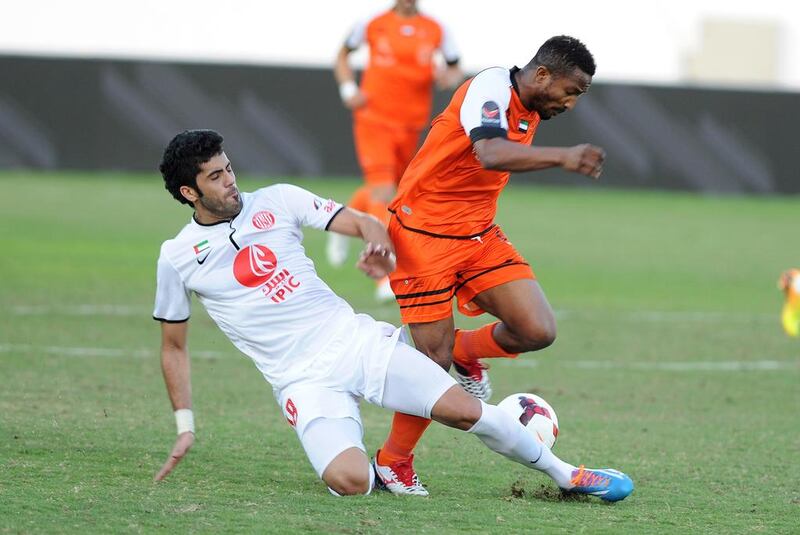Football has two famous “Baky” Kones, both of them hugely popular in west Africa, so when the news broke that Ajman had swooped for one late in the winter transfer window, a quick check on which of the players they had signed was necessary.
Had they recruited Bakary Kone, the imposing central defender who helped inspire Burkina Faso to the final of last year’s Africa Cup of Nations, to shore up a defence that has conceded, on average, close to two goals per game in the Arabian Gulf League this season? Or had they snared the more celebrated, more exciting Bakari Kone, to give them verve and punch up front?
It is the latter, of course, the more senior and … well, much the smaller of the talented Baky Kones. The Ivorian will always be the player whose physical size is remarked on. Many more times than he would care to remember, he has heard himself referred to as a "pocket striker". But almost as many have been the references to his big-heartedness and his vital role in the dressing rooms of the clubs for whom he has played. Ajman have taken on a 1.67-metre (5ft 4ins) forward with a potentially weighty influence on their efforts to move clear of the threat of relegation.
Kone has pedigree, an early education in the game that ranks among the best of his generation of footballers. He became a professional via the ASEC Mimosas academy in Abidjan, principal city of his native Ivory Coast, part of an intake that produced an almost unique concentration of successful modern players, and the majority of the group who would become known as that country’s golden generation. He was brought to ASEC, having been spotted as a child playing on rough grounds in local tournaments, answering to the nickname “Pele”. As Jean-Marc Guillou, who ran the ASEC academy at the time, remembers, he showed outstanding technique, liveliness and intelligence.
At the academy, where his classmates included Kolo Toure, now at Liverpool, Siaka Tiene, later of Paris Saint-Germain, and Didier Zokora, who went on to play for Tottenham Hotspur and Sevilla, among others, Kone was a popular student, confident in the classroom as well as on the training ground. He was part of a senior ASEC squad of dazzling precociousness who won national titles and the 1999 African Super Cup in a memorable match against Tunisia’s Esperance.
Roger Ouegnin, the club chairman, said ASEC had no choice but to field kids because, of the side who had won the Champions Cup a few months before, almost all the players had transferred, mostly to Europe. Ouegnin said: “The Esperance players looked at the kids and laughed before the game and I was thinking how small a little guy like Baky Kone must have looked to them. It really was men against boys.”
Yet little Baky and the boys won.
For many in that ASEC side, the win accelerated their joining the transfer cavalcade direct to Europe, but not for the skilful, quick, intuitive striker. Scouts frequently judged him too small to thrive in Europe’s muscular top leagues. So he moved to Qatar’s Al Ittihad, immediately scored goals at a good ratio and impressed the French coach Christian Gourcuff, who was working there. Gourcuff thought Kone easily tough enough for Europe, and took him with him to his next coaching job, with France’s Lorient where, in his second season in Ligue 2, Kone was the division’s highest scorer.
Kone had by then won the first of what would become more than 40 caps for his national team. Given the abundance of talented strikers available to Ivory Coast over the past decade – from Didier Drogba to Gervinho, plus the Kalou brothers, Bonaventure and Salomon, and Aruna Dindane – that is a substantial total. He was often Drogba’s preferred foil, Kone’s guile complementing the former Chelsea man’s power.
Kone scored the second of his nine international goals at the 2006 World Cup, in a 2-1 defeat by the Netherlands. When he was left out of the squad for the 2010 tournament, having made the shortlist, it had a profound effect on his colleagues, among whom he is popular and admired.
His club career hit its peak in France. From Lorient he joined top-flight Nice, where his reputation soared. Marseille pushed hard for his signature, which they secured after a long wrestle with Nice, for close to €10 million (Dh49.8m). He spent two years at Marseille, contributing to their Ligue 1 triumph in 2010, after which he returned to Qatar. He was named Player of the Season in the Stars League in his first season back in the Gulf, having scored more than a goal every two games for Lekhwiya, with whom he immediately won the Qatar league title.
At 32, he will try out a fourth league. His compatriot, Boris Kabi, encouraged Kone to join him at Ajman. Like every Ivorian, Kabi knows the little guy has the capacity to leave a sizeable imprint.
sports@thenational.ae






